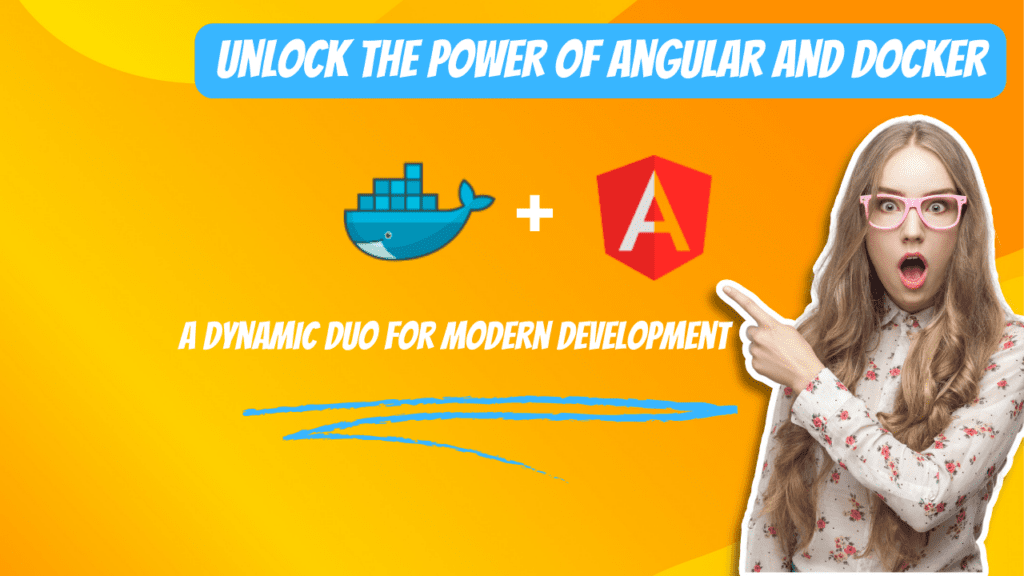Table of Contents
Introduction to Angular and Docker
In the ever-evolving landscape of web development, developers are constantly exploring ways to streamline their workflows and enhance application deployment. This quest for efficiency has led to the powerful combination of Angular, a robust front-end framework, and Docker, a versatile containerization platform.
Angular, developed and maintained by Google, has become a popular choice for building dynamic, single-page web applications. On the other hand, Docker, with its lightweight and portable containers, has revolutionized the way applications are packaged and deployed. Let’s delve into the advantages of integrating Angular with Docker.
Advantages of Using Angular with Docker
Seamless Deployment
Angular applications often face challenges when moving from development to production environments. Docker simplifies this transition by encapsulating the entire application and its dependencies into a container. This ensures a consistent environment across different stages of development, testing, and deployment.
Consistent Environments
Developers often encounter the infamous “it works on my machine” scenario. Docker eliminates this inconsistency by providing a standardized environment. Whether a developer works on a local machine or a team member deploys the application, Docker ensures that the environment remains the same, mitigating potential issues.
Scalability and Resource Optimization
Docker’s containerization enables efficient use of resources. Angular applications running in containers can be easily scaled horizontally, allowing for better resource utilization and improved performance. This scalability is crucial, especially for applications experiencing varying levels of traffic.
Setting Up Angular in a Docker Container
Installing Docker
Before diving into containerizing Angular, it’s essential to have Docker installed. Visit the official Docker website to download and install Docker for your operating system.
Creating an Angular Project
Once Docker is installed, initiate an Angular project using the Angular CLI:
ng new my-angular-app cd my-angular-app
Writing a Dockerfile for Angular
Create a Dockerfile in the project root to define the container image:
# Use the official Node image as the base image FROM node:latest # Set the working directory WORKDIR /usr/src/app # Copy package.json and package-lock.json to the working directory COPY package*.json ./ # Install project dependencies RUN npm install # Copy the entire project to the working directory COPY . . # Expose the application port EXPOSE 4200 # Command to run the application CMD ["npm", "start"]
This Dockerfile specifies the base image, sets the working directory, installs dependencies, and defines the command to start the Angular application.
Containerization Benefits for Angular Projects
Isolation of Dependencies
Containerization isolates Angular app dependencies within the container, preventing conflicts with the host system. This isolation ensures that the application runs consistently across different environments.
Streamlined Development Workflow
Developers can build and test Angular applications in the same containerized environment as the production deployment. This streamlines the development workflow, reducing the likelihood of errors caused by variations between development and production setups.
Version Control and Reproducibility
Docker images can be versioned, providing a consistent environment for collaboration. This ensures that team members working on the same project use identical dependencies and configurations, enhancing reproducibility.
Optimizing Angular Apps with Docker Compose
Managing Multiple Containers
Docker Compose simplifies the management of multi-container applications. Create a docker-compose.yml file to define the services needed for the Angular app:
version: '3'
services:
web:
build: .
ports:
- "4200:4200"
This configuration defines a service named web that builds the Angular app using the Dockerfile and maps port 4200 for access.
Defining Services in Docker Compose
Extend the docker-compose.yml file to include additional services, such as databases or backend APIs, required for the Angular app. Docker Compose orchestrates these services, ensuring seamless communication between containers.
Orchestrating Angular Services
Docker Compose enables the orchestration of Angular services, providing a unified environment for development, testing, and deployment. This streamlined approach enhances collaboration and ensures consistent behavior across different stages of the application lifecycle.
Security Considerations
Container Security Best Practices
While Docker provides isolation, it’s crucial to follow container security best practices. Regularly update base images, minimize the use of unnecessary privileges, and implement network segmentation to enhance the security posture of Angular applications within Docker containers.
Securing Angular Applications within Docker Containers
Secure Angular applications by implementing HTTPS, validating user inputs, and keeping dependencies up to date. Docker security and Angular application security should be considered complementary, working together to create a robust defense against potential threats.
Debugging Angular Apps in Docker
Troubleshooting in a Containerized Environment
Debugging Angular applications within Docker containers can be challenging. Use the following techniques to troubleshoot issues:
- Check Docker logs for error messages.
- Utilize the Angular CLI’s built-in debugging tools.
- Attach a debugger to the running Angular container for more in-depth analysis.
Utilizing Docker Logs for Debugging
Access Docker logs using the following command:
docker logs <container_id>
Pro Tip: If you want to continuously monitor the container logs you can use –follow flag:
docker logs --follow <container_id>
and along with that, if you wish to see the last number of lines to trace, you can use –tail <number of lines> flag:
docker logs --follow <container_id> --tail <number of lines> # e.g. docker logs --follow my-angular-container --tail 200
Docker logs provide valuable insights into application behavior, error messages, and potential issues, aiding in efficient debugging.
Continuous Integration and Deployment (CI/CD) with Angular and Docker
Integration of CI/CD Pipelines
Integrate CI/CD pipelines to automate the build, testing, and deployment of Angular applications with Docker. Platforms like Jenkins, GitLab CI, or GitHub Actions can be configured to trigger pipeline execution upon code changes.
Automating Angular App Deployment with Docker
Define deployment scripts within CI/CD pipelines to automate the deployment of Angular applications using Docker. These scripts can push Docker images to container registries and deploy the updated application to hosting platforms like Kubernetes or cloud services.
Performance Tuning for Angular in Docker
Optimizing Container Resources
Fine-tune container resources to optimize the performance of Angular applications. Adjust CPU and memory allocations based on application requirements and usage patterns to achieve an optimal balance between performance and resource utilization.
Improving Application Speed and Efficiency
Implement Angular performance best practices, such as lazy loading, ahead-of-time (AOT) compilation, and efficient data binding. These optimizations, combined with Docker’s containerization benefits, contribute to a faster and more efficient Angular application.
Scaling Angular Apps Using Docker Swarm
Introduction to Docker Swarm
Docker Swarm is a native clustering and orchestration solution for Docker. Use Docker Swarm to scale Angular applications horizontally by deploying multiple instances across a swarm of nodes.
Scaling Angular Applications Horizontally
Scale Angular applications horizontally by increasing the number of replicas within the Docker Swarm. This ensures high availability, load balancing, and improved responsiveness, especially during periods of increased traffic.
Real-world Use Cases and Success Stories
Companies Benefiting from Angular and Docker
Numerous companies have embraced the Angular and Docker combination to enhance their development and deployment processes. Case studies highlight the success stories of organizations that have realized significant improvements in efficiency, scalability, and maintainability.
Showcasing Successful Implementations
Explore real-world implementations, such as how a leading e-commerce platform achieved seamless scalability using Angular and Docker. These success stories serve as inspiration for other businesses looking to leverage the dynamic duo of Angular and Docker.
Community and Support for Angular-Docker Integration
Online Communities and Forums
Join online communities and forums dedicated to Angular and Docker integration. Platforms like Stack Overflow, Reddit, and the official Docker and Angular forums provide valuable insights, troubleshooting assistance, and collaborative support.
Seeking Help and Contributing to the Community
Engage with the community by seeking help for challenges encountered during Angular and Docker integration. Additionally, contribute by sharing experiences, best practices, and solutions to foster a collaborative environment.
Future Trends and Updates
Upcoming Features in Angular and Docker
Stay informed about upcoming features and updates in Angular and Docker. Both communities actively contribute to enhancing their technologies, introducing new functionalities, and addressing emerging challenges. Keeping abreast of these developments ensures that developers remain at the forefront of modern web development.
Staying Ahead with Evolving Technologies
Adaptability is key in the dynamic world of technology. Developers leveraging Angular and Docker should stay ahead by exploring emerging trends, attending conferences, and participating in webinars. This proactive approach ensures that applications remain modern, secure, and well-aligned with industry standards.
Challenges and Solutions
Addressing Common Issues
While the Angular and Docker integration offers numerous benefits, developers may encounter challenges such as version compatibility issues, complex configurations, or performance bottlenecks. Address these issues by referring to community resources, documentation, and implementing best practices.
Best Practices for Overcoming Challenges
Developers can overcome challenges by adhering to best practices, conducting thorough testing, and seeking guidance from experienced practitioners. The community-driven nature of both Angular and Docker ensures a wealth of knowledge and solutions to common issues.
Conclusion
In conclusion, the integration of Angular with Docker presents a powerful synergy for modern web development. The seamless deployment, consistent environments, and scalability offered by Docker complement the robustness and flexibility of Angular. As developers continue to adopt containerization practices, the Angular-Docker combination stands out as a dynamic duo, streamlining workflows and enhancing the efficiency of application development and deployment.
FAQs
- Is Docker suitable for small-scale Angular projects?
- Yes, Docker’s flexibility makes it suitable for projects of all sizes. It provides benefits such as consistent environments and streamlined deployment.
- How can I optimize the performance of my Angular app within a Docker container?
- Optimize performance by adjusting container resources, implementing Angular best practices, and utilizing Docker’s scalability features.
- What security measures should I take when deploying Angular applications in Docker?
- Follow container security best practices, secure Angular applications, implement HTTPS, and keep dependencies up to date.
- Can I use Docker Compose for more complex Angular projects with multiple services?
- Yes, Docker Compose is versatile and can be used to manage multi-container applications, including those with various Angular services.
- Are there any upcoming features in Angular and Docker that developers should be aware of?
- Stay informed about the latest updates in Angular and Docker communities to leverage upcoming features and enhancements.

Aniket Kamthe
With over a decade of hands-on expertise in the IT sector, specializing in Full-Stack Development and excelling as a Technical Architect and DevOps professional. Proficient in renowned cloud platforms like AWS, Azure, and GCP. Passionate about exploring Artificial Intelligence and Machine Learning realms.
In addition to his IT prowess, he harbors a keen interest in electronic gadgets, online digital marketing, blogging, technology, web tech, and programming. Dedicated to expanding factual knowledge in these domains.




